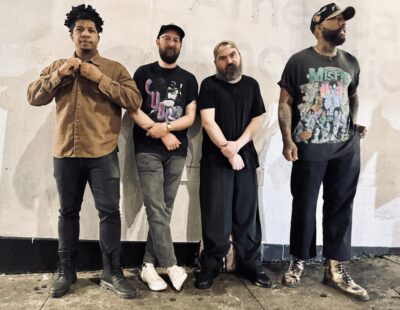Name five great metal bands. Here’s the first ones that come to my mind: Judas Priest, Black Sabbath, Iron Maiden, Metallica and Slayer. What makes them great? Priest and Maiden have iconic, virtuosic vocalists. Metallica, Black Sabbath and Slayer more or less all created their own sort of subgenres. But the one thing all five have–and indeed, ALL great bands in any style have–are a collection of perfect, timeless songs. Period. End of story. In this age of file-sharing, Pro Tools and Facebook, songcraft is rapidly becoming a dying art .
So, what can you do to get your band or project from where it is to where you want it to be? Well, I think you need one of the Big Three: great songs, instrumental or vocal virtuosity, or incredible personal charisma (don’t hate me for having all three). It also helps to have something original, like the sound of Ozzy’s voice, Trevor Peres’ guitar sound, Alice in Chains’ vocal harmonies, etc. But the only one of those that can really be approached as a group goal by a band is songwriting. You definitely can get better at writing every day, every week, every month, and every recording project. The Beatles went from “She Loves You” to “Eleanor Rigby” in a very short time. That was no accident.
And that is the only thing that will give your band any sort of long-term credibility. Wanna be clever? Meshuggah is gonna bury you. “We’re super fast”? George Kollias will be unlikely to lose sleep. Trying to be the most “evil”? Grow up. But the one thing that almost everybody likes is a great, catchy song.
I recently worked for over a year with a band. This band would literally spend hours and hours every week on Facebook. The bandleader would routinely spend 3-5 hours per night (!) promoting tiny gigs on Facebook that would end up being attended by 30 or 40 people. They would bend over backwards , obsessively responding to every little comment about “please come to Uruguay” or words to that effect. But the one thing they absolutely and resolutely refused to do was put any effort whatsoever into improving their songs or playing their instruments. The majority of the members are actually unable to play their parts correctly for even one of their songs. It’s sad. I tried everything: I begged, pleaded, cajoled, bullied, bribed. Nope. Absolutely not. The main songwriter and the singer were willing , but sometimes it really does take a village.
It got so bad that they sent a song I worked many hours on in pre-production away to be mixed. The guy that mixed it rerecorded their parts himself. They were totally fine with this. A complete lack of artistic integrity. And it really bothers me, because I believe in them ( or most of them ). But that refusal to care at least as much–if not more–about the icing than the cake has resulted in the building of a house of cards. It simply can’t remain standing.
It’s immensely frustrating. (As an aside, the vocalist did take what I said to heart, and has become someone I feel is capable of fronting any world-class band out there.) I love teaching. I love seeing the look in someone’s eyes when they realize the possibilities. When they hear magic in their music or playing that they never realized was there until we uncovered it. When they go from what they are to what they are really capable of being. But alas…
So, how do you apply this epic wisdom in a practical way? Here’s a few ideas/suggestions:
1. Set Your Sights High
Why aim for mediocrity? Expect and only accept the absolute best that you can offer in any creative situation. Idolize Slayer? Make your goal to write a song as good as “Raining Blood.” Why not? THEY did it, didn’t they? Throw out every single riff, progression, lyric, melody and part that you have that is substandard. It can be difficult to live like that as first, because you tend to lose most of your ideas. But over time, if you make it a habit, the rewards are enormous. When I was in my early teens, there were a lot of talented guitarists in my peer group. The single most important factor in my subsequent progress compared to theirs was this: They all wanted to compete with each other. They all wanted to be the best at our school, music store, whatever. I never cared about that. I had in my mind that I wanted to be as good as Randy Rhoads and Michael Schenker. Obviously, I didn’t achieve that goal. But where I fell was a hell of a lot further down the road than if my goal was to be the best guitarist in my neighborhood. The flip side of that is…
2. Be Brutally Honest With Yourself
Listen to great music with all of your attention. Dissect it. Listen to it both analytically and emotionally. Absorb it. And then listen to your music the same way. Just because people on FB or wherever are telling you how awesome you are, that means NOTHING. Compare your ideas to the people you consider to be the true greats, the ones you aspire to be like. Inevitably, you are gonna fall short. Don’t be discouraged. You’ve reset your goals, and it will take time to see the results. Which leads us to…
3. Make It a Habit!!!!!!
Writing, like most artistic processes, is just that: a process. You can never finish. You’ll never be “there.” You’ll never reach a point where every song you write is gonna be amazing, every riff a classic. But if you make it your goal to do just that, and then work a little or a lot every day to get closer to that goal, you’re gonna see results. Big time. And next week, you’re gonna be better than today. A year from now ? LOOK OUT Y’ALL !!! Just keep at it 24/7, and best of luck!





